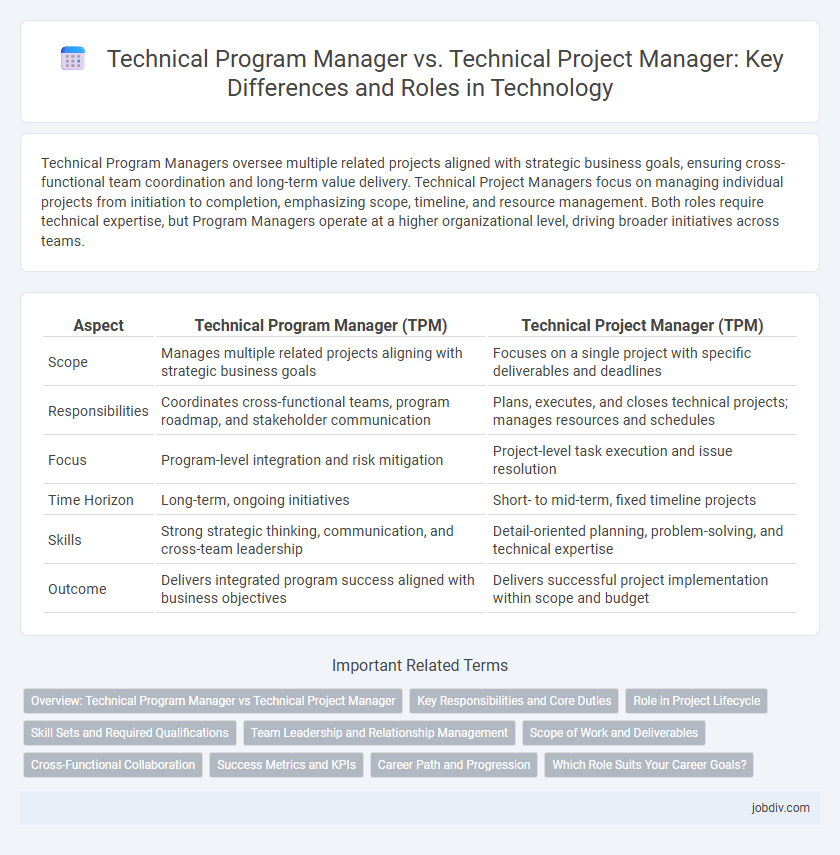Technical Program Managers oversee multiple related projects aligned with strategic business goals, ensuring cross-functional team coordination and long-term value delivery. Technical Project Managers focus on managing individual projects from initiation to completion, emphasizing scope, timeline, and resource management. Both roles require technical expertise, but Program Managers operate at a higher organizational level, driving broader initiatives across teams.
Table of Comparison
| Aspect | Technical Program Manager (TPM) | Technical Project Manager (TPM) |
|---|---|---|
| Scope | Manages multiple related projects aligning with strategic business goals | Focuses on a single project with specific deliverables and deadlines |
| Responsibilities | Coordinates cross-functional teams, program roadmap, and stakeholder communication | Plans, executes, and closes technical projects; manages resources and schedules |
| Focus | Program-level integration and risk mitigation | Project-level task execution and issue resolution |
| Time Horizon | Long-term, ongoing initiatives | Short- to mid-term, fixed timeline projects |
| Skills | Strong strategic thinking, communication, and cross-team leadership | Detail-oriented planning, problem-solving, and technical expertise |
| Outcome | Delivers integrated program success aligned with business objectives | Delivers successful project implementation within scope and budget |
Overview: Technical Program Manager vs Technical Project Manager
Technical Program Managers oversee multiple interrelated projects, aligning them with strategic business goals and ensuring cross-functional collaboration, while Technical Project Managers focus on the execution and delivery of individual projects within scope, time, and budget constraints. Program management involves long-term planning, risk mitigation, and resource allocation across multiple teams, contrasting with project management's emphasis on task-specific coordination and milestone tracking. Both roles require technical expertise and leadership, but Technical Program Managers typically operate at a higher strategic level, managing dependencies and stakeholder communication across broader initiatives.
Key Responsibilities and Core Duties
Technical Program Managers oversee multiple related projects, ensuring alignment with strategic business goals through cross-functional coordination, resource optimization, and risk management. Technical Project Managers focus on planning, executing, and closing individual projects by managing scope, schedule, budget, and stakeholder communication. Program management emphasizes long-term strategy and interdependencies, while project management centers on tactical execution and deliverables within a defined timeline.
Role in Project Lifecycle
A Technical Program Manager oversees multiple interrelated projects, ensuring alignment with strategic business objectives throughout the entire program lifecycle, from initiation to delivery and post-launch evaluation. In contrast, a Technical Project Manager focuses on the successful execution of individual projects, managing scope, schedule, resources, and risks to meet project-specific goals within defined timelines. Both roles require collaboration with cross-functional teams, but the Program Manager emphasizes long-term value and integration across projects, while the Project Manager concentrates on tactical project execution and deliverables.
Skill Sets and Required Qualifications
Technical Program Managers typically require advanced skills in cross-functional team leadership, strategic planning, and risk management, often supported by a background in software development or engineering. Technical Project Managers focus on detailed project execution, scheduling, resource allocation, and budget management, with qualifications that emphasize PMP certification and hands-on project experience. Both roles demand strong communication and problem-solving abilities, but Program Managers prioritize program-level oversight while Project Managers specialize in delivering specific project objectives on time and within scope.
Team Leadership and Relationship Management
Technical Program Managers oversee multiple related projects, coordinating cross-functional teams to deliver complex initiatives aligned with broader business goals, emphasizing strategic leadership and stakeholder relationship management. Technical Project Managers focus on individual project execution, managing team tasks, schedules, and resources to ensure timely delivery while fostering collaboration within project teams. Both roles require strong communication skills, but Program Managers prioritize broader team alignment and cross-team stakeholder engagement, whereas Project Managers concentrate on direct team leadership and task-level coordination.
Scope of Work and Deliverables
Technical Program Managers oversee multiple related projects, coordinating cross-functional teams to achieve strategic business objectives, with deliverables including integrated roadmaps, program-level risks, and performance metrics. Technical Project Managers focus on individual projects, managing scope, timelines, and resources to deliver specific products or features, ensuring milestones and project-specific documentation are completed. The scope of work for program managers emphasizes long-term alignment and dependencies, while project managers concentrate on execution and delivery within defined parameters.
Cross-Functional Collaboration
Technical Program Managers drive cross-functional collaboration by aligning multiple projects with strategic goals, ensuring synchronization across engineering, product, and business teams. Technical Project Managers focus on coordinating specific project tasks and timelines within individual teams to achieve targeted deliverables. Effective cross-functional collaboration requires Program Managers to facilitate communication between diverse stakeholders, while Project Managers execute detailed plans within those frameworks.
Success Metrics and KPIs
Technical Program Managers measure success through overarching KPIs such as program delivery timelines, cross-team collaboration efficiency, and achievement of strategic business objectives. Technical Project Managers focus on specific project success metrics including adherence to budget, on-time task completion, and scope management effectiveness. Both roles use quantitative data like velocity, resource utilization, and stakeholder satisfaction scores to drive continuous improvement and ensure alignment with organizational goals.
Career Path and Progression
Technical Program Managers oversee multiple related projects, coordinating cross-functional teams to drive long-term strategic goals and requiring strong leadership in managing complex programs. Technical Project Managers focus on delivering specific projects on time, budget, and scope, honing skills in detailed planning and execution. Career progression for Technical Program Managers often leads to senior leadership roles such as Director of Program Management, while Technical Project Managers may advance to Program Manager roles or specialize in project portfolio management.
Which Role Suits Your Career Goals?
A Technical Program Manager oversees multiple related projects aligned with strategic business objectives, coordinating cross-functional teams to deliver complex outcomes, making this role ideal for professionals aiming to drive long-term impact and organizational growth. In contrast, a Technical Project Manager focuses on the execution and delivery of individual projects, managing scope, timelines, and resources, which suits those who prefer hands-on management of specific technical initiatives. Choosing between these roles depends on your career goals: seek a broader, strategic influence with program management or specialize in detailed project execution with project management.
Technical Program Manager vs Technical Project Manager Infographic

 jobdiv.com
jobdiv.com